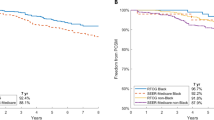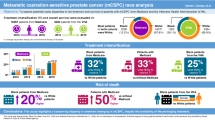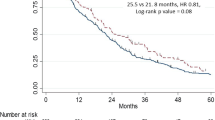Abstract
Background:
To examine the impact of race on treatment regret among men with recurrent prostate cancer after surgery or radiation.
Methods:
The prospective Comprehensive, Observational, Multicenter, Prostate Adenocarcinoma (COMPARE) registry was used to study a cohort of 484 men with biochemically recurrent prostate cancer after radical prostatectomy, external beam radiation or brachytherapy. Multivariable logistic regression was used to model the association between race and treatment regret and to determine whether there was an interaction between race and sexual problems after treatment with regards to treatment regret.
Results:
Black men (N=78) were significantly more likely to have treatment regret when compared with non-black men (N=406; 21.8% versus 12.6%) on univariable analysis (odds ratio (OR) 1.94; 95% confidence interval 1.05–3.56; P=0.03). On multivariable analysis, black race trended towards but was no longer significantly associated with an increase in treatment regret (adjusted OR (AOR) 1.84 (0.95–3.58); P=0.071). There was an interaction between race and sexual problems after treatment (Pinteraction=0.02) such that among those without sexual problems, black men had more treatment regret than non-black men (26.7% versus 8.4%: AOR 4.68 (1.73–12.63); P=0.002), whereas among those with sexual problems, there was no difference in treatment regret between black and non-black men (18.8% versus 17.3%: AOR 1.04 (0.44–2.46); P=0.93).
Conclusions:
Among men with recurrent prostate cancer after surgery or radiation, black men were nearly twice as likely to experience treatment regret. Treating physicians should ensure that patients are fully apprised of the pros and cons of all treatment options to reduce the risk of subsequent regret.
This is a preview of subscription content, access via your institution
Access options
Subscribe to this journal
Receive 4 print issues and online access
$259.00 per year
only $64.75 per issue
Buy this article
- Purchase on Springer Link
- Instant access to full article PDF
Prices may be subject to local taxes which are calculated during checkout
Similar content being viewed by others
References
Siegel R, Ma J, Zou Z, Jemal A . Cancer statistics, 2014. CA Cancer J Clin 2014; 64: 9–29.
NCCN Clinical Practice Guidelines in Oncology. Prostate Cancer 2014. Available at http://www.nccn.org. Accessed 30 December 2013.
Resnick MJ, Koyama T, Fan KH, Albertsen PC, Goodman M, Hamilton AS et al. Long-term functional outcomes after treatment for localized prostate cancer. N Engl J Med 2013; 368: 436–445.
Sanda MG, Dunn RL, Michalski J, Sandler HM, Northouse L, Hembroff L et al. Quality of life and satisfaction with outcome among prostate-cancer survivors. N Engl J Med 2008; 358: 1250–1261.
Pardo Y, Guedea F, Aguilo F, Fernandez P, Macias V, Marino A et al. Quality-of-life impact of primary treatments for localized prostate cancer in patients without hormonal treatment. J Clin Oncol 2010; 28: 4687–4696.
Eggener SE, Scardino PT, Walsh PC, Han M, Partin AW, Trock BJ et al. Predicting 15-year prostate cancer specific mortality after radical prostatectomy. J Urol 2011; 185: 869–875.
Warde P, Mason M, Ding K, Kirkbride P, Brundage M, Cowan R et al. Combined androgen deprivation therapy and radiation therapy for locally advanced prostate cancer: a randomised, phase 3 trial. Lancet 2011; 378: 2104–2111.
Klotz L, Zhang L, Lam A, Nam R, Mamedov A, Loblaw A . Clinical results of long-term follow-up of a large, active surveillance cohort with localized prostate cancer. J Clin Oncol 2010; 28: 126–131.
Clark JA, Wray NP, Ashton CM . Living with treatment decisions: regrets and quality of life among men treated for metastatic prostate cancer. J Clin Oncol 2001; 19: 72–80.
Hu JC, Kwan L, Saigal CS, Litwin MS . Regret in men treated for localized prostate cancer. J Urol 2003; 169: 2279–2283.
Soeyonggo T, Warde P, Fleshner N, Timilshina N, Alibhai SM . Information needs of men on androgen deprivation therapy. BJU Int 2012; 109: 1503–1509.
Gwede CK, Pow-Sang J, Seigne J, Heysek R, Helal M, Shade K et al. Treatment decision-making strategies and influences in patients with localized prostate carcinoma. Cancer 2005; 104: 1381–1390.
Davison BJ, So AI, Goldenberg SL . Quality of life, sexual function and decisional regret at 1 year after surgical treatment for localized prostate cancer. BJU Int 2007; 100: 780–785.
Diefenbach MA, Mohamed NE . Regret of treatment decision and its association with disease-specific quality of life following prostate cancer treatment. Cancer Invest 2007; 25: 449–457.
Halbert CH, Weathers B, Delmoor E, Mahler B, Coyne J, Thompson HS et al. Racial differences in medical mistrust among men diagnosed with prostate cancer. Cancer 2009; 115: 2553–2561.
Moore AD, Hamilton JB, Knafl GJ, Godley PA, Carpenter WR, Bensen JT et al. The influence of mistrust, racism, religious participation, and access to care on patient satisfaction for African American men: the North Carolina-Louisiana Prostate Cancer Project. J Natl Med Assoc 2013; 105: 59–68.
Collingwood SA, McBride RB, Leapman M, Hobbs AR, Kwon YS, Stensland KD et al. Decisional regret after robotic-assisted laparoscopic prostatectomy is higher in African American men. Urol Oncol 2014; 32: 419–425.
Ratcliff CG, Cohen L, Pettaway CA, Parker PA . Treatment regret and quality of life following radical prostatectomy. Support Care Cancer 2013; 21: 3337–3343.
Clarke-Tasker VA, Wade R . What we thought we knew: African American males' perceptions of prostate cancer and screening methods. ABNFJ 2002; 13: 56–60.
Lambert S, Fearing A, Bell D, Newton M . A comparative study of prostate screening health beliefs and practices between African American and Caucasian men. ABNF J 2002; 13: 61–63.
Woods VD, Montgomery SB, Belliard JC, Ramirez-Johnson J, Wilson CM . Culture, black men, and prostate cancer: what is reality? Cancer Control 2004; 11: 388–396.
Forrester-Anderson IT . Prostate cancer screening perceptions, knowledge and behaviors among African American men: focus group findings. J Health Care Poor Underserv 2005; 16 (4 Suppl A): 22–30.
Sartor O, McLeod DG, Halabi S, Schellhammer PF, Scardino PT, D'Amico AV et al. The COMPARE Registry: design and baseline patterns of care for men with biochemical failure after definitive treatment of localized prostate cancer. Urology 2010; 75: 623–629.
Befort CA, Zelefsky MJ, Scardino PT, Borrayo E, Giesler RB, Kattan MW . A measure of health-related quality of life among patients with localized prostate cancer: results from ongoing scale development. Clin Prostate Cancer 2005; 4: 100–108.
Arozullah AM, Yarnold PR, Bennett CL, Soltysik RC, Wolf MS, Ferreira RM et al. Development and validation of a short-form, rapid estimate of adult literacy in medicine. Med Care 2007; 45: 1026–1033.
Nguyen PL, Chen MH, Hoffman KE, Chen RC, Hu JC, Bennett CL et al. Cardiovascular comorbidity and treatment regret in men with recurrent prostate cancer. BJU Int 2012; 110: 201–205.
Stokes WA, Hendrix LH, Royce TJ, Allen IM, Godley PA, Wang AZ et al. Racial differences in time from prostate cancer diagnosis to treatment initiation: a population-based study. Cancer 2013; 119: 2486–2493.
Underwood W, De Monner S, Ubel P, Fagerlin A, Sanda MG, Wei JT . Racial/ethnic disparities in the treatment of localized/regional prostate cancer. J Urol 2004; 171: 1504–1507.
Presley CJ, Raldow AC, Cramer LD, Soulos PR, Long JB, Yu JB et al. A new approach to understanding racial disparities in prostate cancer treatment. J Geriatr Oncol 2013; 4: 1–8.
Ryoo JJ, Ordin DL, Antonio AL, Oishi SM, Gould MK, Asch SM et al. Patient preference and contraindications in measuring quality of care: what do administrative data miss? J Clin Oncol 2013; 31: 2716–2723.
Hu JC, Kwan L, Krupski TL, Anger JT, Maliski SL, Connor S et al. Determinants of treatment regret in low-income, uninsured men with prostate cancer. Urology 2008; 72: 1274–1279.
Schroeck FR, Krupski TL, Sun L, Albala DM, Price MM, Polascik TJ et al. Satisfaction and regret after open retropubic or robot-assisted laparoscopic radical prostatectomy. Eur Urol 2008; 54: 785–793.
Davis JW, Kuban DA, Lynch DF, Schellhammer PF . Quality of life after treatment for localized prostate cancer: differences based on treatment modality. J Urol 2001; 166: 947–952.
Feldman-Stewart D, Tong C, Siemens R, Alibhai S, Pickles T, Robinson J et al. The impact of explicit values clarification exercises in a patient decision aid emerges after the decision is actually made: evidence from a randomized controlled trial. Med Decision Making 2012; 32: 616–626.
Aning JJ, Wassersug RJ, Goldenberg SL . Patient preference and the impact of decision-making aids on prostate cancer treatment choices and post-intervention regret. Curr Oncol 2012; 19 (Suppl 3): S37–S44.
Winterich JA, Grzywacz JG, Quandt SA, Clark PE, Miller DP, Acuna J et al. Men's knowledge and beliefs about prostate cancer: education, race, and screening status. Ethnic Dis 2009; 19: 199–203.
Acknowledgements
This work is supported by David and Cynthia Chapin, the Prostate Cancer Foundation, Fitz’s Cancer Warriors, Hugh Simons in honor of Frank and Anne Simons and a grant from an anonymous family foundation.
Author information
Authors and Affiliations
Corresponding author
Ethics declarations
Competing interests
The authors declare no conflict of interest.
Rights and permissions
About this article
Cite this article
Mahal, B., Chen, MH., Bennett, C. et al. The association between race and treatment regret among men with recurrent prostate cancer. Prostate Cancer Prostatic Dis 18, 38–42 (2015). https://doi.org/10.1038/pcan.2014.42
Received:
Revised:
Accepted:
Published:
Issue Date:
DOI: https://doi.org/10.1038/pcan.2014.42
This article is cited by
-
Adaptation and Initial Psychometric Evaluation of an Informed Prostate Cancer Screening Decision Self-Efficacy Scale for African-American Men
Journal of Racial and Ethnic Health Disparities (2020)



